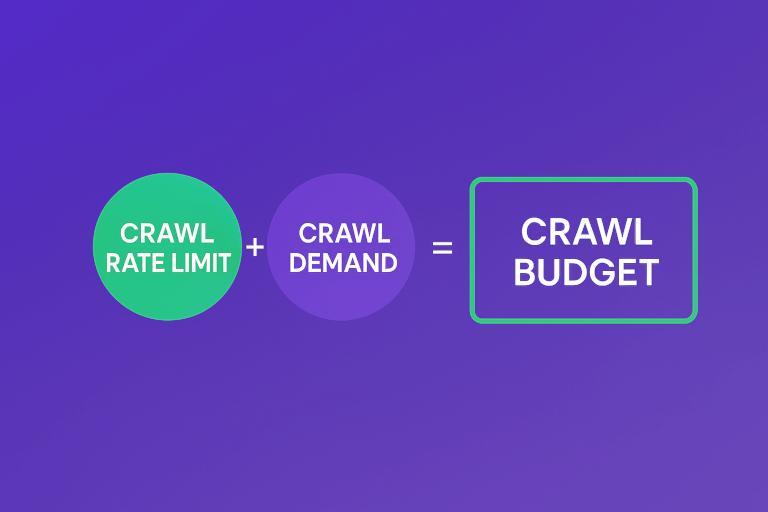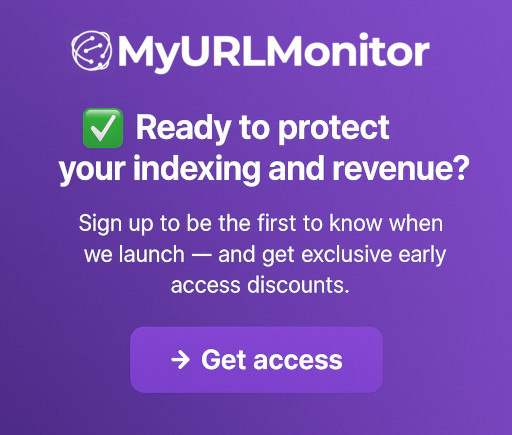
MyURLMonitor Editorial
MyURLMonitor Editorial
Crawl Budget in 2025: What It Means for SEO & How to Monitor It Effectively
Even the best content won't drive results if Google never discovers it. That's why crawl budget remains one of the most important — and misunderstood — concepts in SEO.
Simply put, crawl budget determines how often and how deeply Googlebot crawls your website. If your site wastes crawl resources on duplicate, irrelevant, or low-value pages, your most important URLs may be delayed or skipped entirely.
In 2025, the topic is still evolving. A Search Engine Land article emphasized that while crawl budget concerns mainly affect large and complex websites, smaller sites can also run into indexing inefficiencies.
This guide goes beyond the basics. We'll explain what crawl budget really means in 2025, why it matters, how to monitor it effectively, and how tools like MyURLMonitor help SEO experts and developers ensure their most valuable pages are always discovered and indexed.
What Is Crawl Budget? (2025 Definition)
At its core, crawl budget is the combination of two factors:
-
Crawl Rate Limit – How many requests Googlebot can make to your server without overwhelming it.
-
Crawl Demand – How much Google actually wants to crawl your site, based on signals like link authority, content freshness, and popularity.
Together, these determine how many URLs Googlebot will crawl in a given timeframe.
In practice, crawl budget isn't a single setting you can tweak. Instead, it reflects Google's algorithmic decisions about how to allocate crawling resources.
In 2025, improvements in AI-driven crawling, rendering of JavaScript, and better prioritization mean Googlebot is smarter than ever — but crawl budget waste is still a real problem for websites with poor technical hygiene.

Why Crawl Budget Still Matters in 2025
Some SEOs argue crawl budget only matters for massive sites with millions of URLs. But in reality, any site can be affected. Here's why:
-
Efficient indexation – Making sure your critical pages are discovered quickly.
-
Faster updates – Fresh content, product launches, and critical updates should appear in Google fast.
-
Reduced crawl waste – Stop bots from spending time on duplicate URLs, expired products, or broken links.
-
SEO ROI – Every wasted crawl is a missed opportunity for rankings.
Even small and medium websites with 10,000+ pages can run into crawl inefficiencies. In competitive niches, those inefficiencies can mean the difference between being found — or being invisible.
How to Check Crawl Budget
The good news is that you don't need guesswork. Crawl budget can be measured with the right tools:
1. Google Search Console
-
Crawl Stats report: Shows how many requests Googlebot makes, response times, and crawl types.
-
Index Coverage report: Reveals which pages are indexed (or excluded).
2. Server Log Analysis
-
The most reliable way to see exactly what Googlebot is doing.
-
Tells you which URLs are being crawled, how often, and which are being ignored.
-
Requires access to hosting logs and some technical setup.
3. Continuous Monitoring with MyURLMonitor
Google's reports are powerful, but they're retroactive. By the time you notice an issue, valuable pages may have been left out of the index for weeks.
That's where MyURLMonitor comes in:
-
Tracks whether your most important URLs are crawled and indexed in near real time.
-
Sends alerts when URLs drop from the index or when crawling patterns change.
-
Helps you separate high-priority URLs from unimportant ones.
In other words, MyURLMonitor gives you the visibility Google won't.
Common Crawl Budget Issues
If you're wondering why Googlebot might be wasting time, here are the most frequent culprits:
-
Duplicate content & parameterized URLs (e.g., ?color=blue, ?sessionid=123).
-
Slow server response times, causing Googlebot to reduce crawl rate.
-
Poor internal linking, making key pages hard to discover.
-
Thin or low-quality pages that don't deserve attention.
-
Orphaned pages that exist but aren't linked anywhere.
-
Misconfigured robots.txt or "noindex" tags blocking useful content.
Crawl Budget Optimization Strategies
Improving crawl efficiency means removing waste and making it easier for Googlebot to find what matters.
Technical Fixes
-
Speed up server response times with better hosting or caching.
-
Optimize robots.txt to block truly unnecessary pages.
-
Use canonical tags correctly to prevent duplicate crawls.
Content Fixes
-
Consolidate or prune thin, duplicate, or expired pages.
-
Refresh and improve content on URLs you want crawled more often.
Structural Fixes
-
Strengthen internal linking to highlight priority pages.
-
Keep XML sitemaps clean and updated with only relevant URLs.
Monitoring Fixes
-
Use MyURLMonitor to ensure fixes actually work:
-
Get notified when key URLs fall out of the index.
-
Compare crawl activity before and after optimizations.
-
Ensure new content is picked up quickly by Google.
-
Crawl Budget & Indexing Automation
Crawl budget optimization isn't a one-time fix — it's an ongoing process. Large sites, in particular, need continuous monitoring and automation.
Here's how MyURLMonitor helps automate the process:
-
Indexing checks: Know within hours if a new page is missing from the index.
-
Crawl coverage tracking: Compare expected crawls with real-world indexing.
-
Alerting & reporting: Get notified of crawl drops or unusual patterns.
This proactive approach ensures you don't just fix crawl issues once, but maintain efficiency month after month.
FAQs: Crawl Budget in 2025
Does crawl budget matter for small websites?
Not usually — unless you have technical problems (e.g., duplicate URLs, blocked resources). But if you're publishing new content frequently, monitoring is still valuable.
What's the best tool to monitor crawl budget?
Google Search Console is free and essential. But for real-time insights and automation, specialized tools like MyURLMonitor give SEO experts and developers the edge.
How often should I check crawl budget?
At least quarterly for smaller sites; weekly or even daily for large, complex, or ecommerce sites.
Does crawl budget directly impact rankings?
Not directly — but if key URLs aren't crawled or indexed, they can't rank. Crawl budget is about opportunity: making sure ranking pages are discovered in the first place.
Conclusion
Crawl budget isn't the flashiest SEO topic, but it's one of the most practical. In 2025, ensuring that Googlebot crawls the right pages — quickly and efficiently — is still critical for search visibility.
The key takeaway: Crawl budget optimization = more visibility, faster indexing, and better SEO ROI.
If you want to ensure Google never overlooks your most important URLs, try MyURLMonitor. With continuous monitoring, real-time alerts, and indexing insights, you'll finally have the visibility and control you need to make crawl budget work for you.

